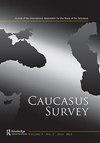An explorative analysis of Azerbaijan’s Covid-19 policy response and public opinion
IF 0.4
Q3 AREA STUDIES
引用次数: 2
Abstract
ABSTRACT In responding to the Covid-19 (SARS-CoV-2) pandemic, some policy responses to suppress and mitigate the disease’s socio-economic effects have been more effective than others. Despite resource wealth Azerbaijan has a problem with public trust in institutions, which is revealed in the responses to Covid-19, especially its economic impacts. This research employs a mixed-method approach to explore Azerbaijan’s Covid-19 policy response and its socio-economic effects. An explorative analysis reveals the country’s poor level of preparedness before the pandemic and ambiguous public opinion on the government’s anti-pandemic policies. A substantial part of the population reports low self-perceived satisfaction with life, their financial situation and social environment, and significant concerns about the strict quarantine regime’s long duration and high probability of being unemployed. In addition, people’s satisfaction with life, financial situation, and social environment are statistically significant correlates of public opinion on Azerbaijan’s Covid-19 policy response. Therefore, the government should reconsider its current Covid-19 policy responses for future crisis management policies. Long-term disruption of economic life could have high socio-economic costs and repercussions for well-being, create institutional distrust and bring further instabilities. Enhancing public trust in the state should be a top priority in the government agenda.对阿塞拜疆Covid-19政策应对和公众舆论的探索性分析
摘要在应对新冠肺炎(SARS-CoV-2)大流行的过程中,一些抑制和减轻疾病社会经济影响的政策应对措施比其他政策更有效。尽管资源丰富,但阿塞拜疆在公众对机构的信任方面存在问题,这在应对新冠肺炎的措施中有所体现,尤其是其经济影响。本研究采用混合方法探讨阿塞拜疆的新冠肺炎政策应对及其社会经济影响。一项探索性分析显示,该国在疫情前的准备水平很低,公众对政府的抗疫政策看法不明确。相当一部分人报告说,他们对生活、财务状况和社会环境的自我满意度较低,对严格的隔离制度持续时间长、失业概率高表示严重担忧。此外,人们对生活、财务状况和社会环境的满意度与公众对阿塞拜疆新冠肺炎应对政策的看法在统计上具有显著相关性。因此,政府应该重新考虑其当前的新冠肺炎政策应对措施,以制定未来的危机管理政策。经济生活的长期中断可能会带来高昂的社会经济成本和对福祉的影响,造成制度上的不信任,并带来进一步的不稳定。增强公众对国家的信任应该是政府议程中的首要任务。
本文章由计算机程序翻译,如有差异,请以英文原文为准。
求助全文
约1分钟内获得全文
求助全文
来源期刊

Caucasus Survey
Arts and Humanities-History
CiteScore
1.30
自引率
9.10%
发文量
4
期刊介绍:
Caucasus Survey is a new peer-reviewed, multidisciplinary and independent journal, concerned with the study of the Caucasus – the independent republics of Armenia, Azerbaijan and Georgia, de facto entities in the area and the North Caucasian republics and regions of the Russian Federation. Also covered are issues relating to the Republic of Kalmykia, Crimea, the Cossacks, Nogays, and Caucasian diasporas. Caucasus Survey aims to advance an area studies tradition in the humanities and social sciences about and from the Caucasus, connecting this tradition with core disciplinary concerns in the fields of history, political science, sociology, anthropology, cultural and religious studies, economics, political geography and demography, security, war and peace studies, and social psychology. Research enhancing understanding of the region’s conflicts and relations between the Russian Federation and the Caucasus, internationally and domestically with regard to the North Caucasus, features high in our concerns.
 求助内容:
求助内容: 应助结果提醒方式:
应助结果提醒方式:


